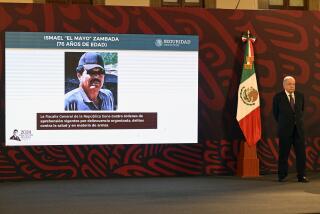O.C. Ship’s Captain to Stand Trial in Mexico
COZUMEL, Mexico — A judge ruled Wednesday night that a ship captain from Orange County must face trial on charges of bringing guns illegally into Mexico, but he dropped charges against the captain’s 71-year-old father and the first mate.
Judge Fidel Villanueva said probable cause existed that as captain of the ship, Scott McClung, 35, had tried to bring weapons into Mexico clandestinely when he sailed his father’s new 150-foot yacht into the harbor of the Cozumel island resort on Aug. 10 with two rifles and three shotguns on board.
The judge ordered McClung to jail pending the trial, which under Mexican law could take as long as one year to get underway. A conviction carries a sentence of five to 30 years. A short time after the hearing, McClung collapsed and was taken to a hospital for observation.
In a chaotic, emotion-charged hearing in an office crowded with crew members, lawyers and reporters, the judge dropped charges against McClung’s father, Eugene, of Laguna Beach and Noah Bailey, the first mate of Dana Point, and ordered the two released from jail.
As crew members consoled each other, the family’s lawyers said they would appeal the ruling and seek bail for Scott McClung. Angry family members warned that the ruling would undermine Mexican democracy and its huge tourist industry.
Defense lawyer Cesar Peniche tried repeatedly to force the judge to acknowledge that the opinion was being issued after the six-day constitutional deadline for a ruling on whether a case should go to trial. But the judge ordered Peniche to be silent or be removed from the courtroom, and said the attorney could file his objections later.
In a brief interview, Scott McClung angrily denounced the ruling before he was led back to the local jail. “It’s just another clear example of how they have no regard for their own laws, which is why they locked us up in the first place,” he said.
Eugene McClung, who had built the boat for the family business of running religious mission voyages and biological research trips for children and university students, said he would fight for his son’s freedom “all the way to the top.”
“I think this is a serious blow to democracy, if there is such a thing here in Mexico, which I don’t believe there is now,” he said. “I think this is going to be bad for the tourist trade here, and what seems to talk down here is dollars.”
Villanueva did not explain his reasoning in his brief verbal opinion, though he also issued a lengthy written decision, which lawyers were studying.
Mexican officials have said they are simply enforcing their strict gun laws to reduce the number of weapons entering Mexico and feeding a worsening wave of violent crime and drug-related violence.
When family lawyer William Bollard of Irvine tried to assist with translations during the proceeding, the judge ordered him to be silent or be removed from the room.
In Dana Point, Bailey’s wife, Carol, said she heard the news on television and was happy that her husband was being released.
“I am very excited,” she said. “But I am very disappointed Scott was not” released.
The three were arrested after they sailed the ship, the Rapture, into the harbor for what they thought would be a 24-hour emergency repair stop. The $4.5-million vessel was en route from Florida, where it was built, through the Panama Canal to Long Beach, its new home port.
As the three men awaited the verdict earlier Wednesday, they sat in a dim, steamy cell at the Cozumel police station. They said the 10-by-20-foot cell was a spacious improvement over the room where they were first held for three days.
They angrily rejected the official charge that they had tried to conceal two semiautomatic rifles and three shotguns, which they said were on open display in a locked glass gun case in the ship’s wheelhouse and were meant for protection.
All three men said they had declared the guns and shown them to the local district attorney, Claudio Sanchez, when he boarded the ship. But they said he returned later with armed police, arrested them and ordered the other 14 crew members and passengers to surrender their passports. Officials returned the passports to those left on the ship early Wednesday.
“We were prepared for piracy on the high seas. That’s why we carried the weapons,” Eugene McClung said. “But we weren’t prepared for piracy in the court of Cozumel.”
Bollard said Sanchez had met with the McClungs’ Mexican lawyers after their arrest and said the matter could be resolved for $10,000, the amount of cash kept aboard the ship for emergencies. But before that deal could be completed, the arrests were publicized in local newspapers, and the deal fell through.
Sanchez said he could not comment on the case while it was in progress, and he declined to respond to any of the McClungs’ accusations.
“The three guys in jail right now have designed this boat in their minds for the last 10 years for their mission work,” said Alton Burkhalter, an Irvine lawyer who has worked for the McClungs for many years. “This was supposed to be a high-water mark. It turned out to be hell in Cozumel.”
Burkhalter said the family had put together a five-member legal team that has presented a series of witnesses, affidavits and documents to the pretrial hearing this week to try to convince the judge that the charge should be dropped and the men freed. U.S. Consul David Ramos in nearby Merida on the mainland Yucatan peninsula visited the inmates in their cell Wednesday to express concern.
“It would be a nightmare for someone without resources to come down here and try to defend himself,” Burkhalter said.
Scores of U.S. citizens have been jailed in Mexico, usually along the northern border, on weapons-possession charges. Some cases often involve a few bullets or a gun supposedly forgotten in the trunk. Mexico is suffering a fierce crime wave, with many offenses committed with guns smuggled in from the United States, and Mexican officials repeatedly have appealed to their U.S. counterparts to do more to halt the flow of guns southward.
Before the hearing, Scott McClung, who has a merchant marine captain’s license from the U.S. Coast Guard, stressed that he was not among those who simply forgot about a gun in the car. Nor, he said, was he unaware of Mexican laws.
“I’ve been operating professionally as a captain in and out of Mexican waters and other foreign ports for 10 years. I’ve always had arms for protection,” he said. “It’s recommended by our government, the U.S. Coast Guard, the embassy and the insurance carriers. I’ve always declared the weapons, just like we did this time. And this is the first time that anything has ever happened like this.”
First mate Bailey said before the ruling that a U.S.-registered ship “is a tiny piece of U.S. soil, and these are normal, legal weapons in the United States. [During the initial inspection] we offered to seal them up or box them, but they said it was fine. They even joked and said, ‘We’ll trade you one of ours for yours.’ ”
Scott McClung said that the first night in custody was traumatic. He and the others were taken to the prosecutor’s island headquarters, where “most of the questioning was about our personal bank accounts, my father’s investments, how much money we had in our wallets and on board.”
During the all-night interrogation, he said, “they would not let us stand up, would not let us sleep--trying everything to get us to trip up, but we had nothing to hide, we were only telling the truth.”
At one point, McClung charged, “they grabbed us, they threw me on an ice chest, shoved my head against the wall, and they tried to push Noah into a bathroom. That was the most scared I’ve been.”
But then calls started coming in from the consul general and from the family’s lawyers. From then on, the treatment improved, he said, and they were moved to a more spacious cell in the police lockup, where each had an old mattress.
He said the arrests had delayed the first scheduled professional voyage for the Rapture--a trip for underprivileged children from Orange County. The ship is designed to sleep 150 children on such trips.
“We don’t have a problem with Mexico. We’ve worked here for years and have run into many great people. We love the environment and the people,” McClung said. “But there are still a few bad eggs.”
Times staff writer Yung Kim contributed to this report.
More to Read
Sign up for Essential California
The most important California stories and recommendations in your inbox every morning.
You may occasionally receive promotional content from the Los Angeles Times.










